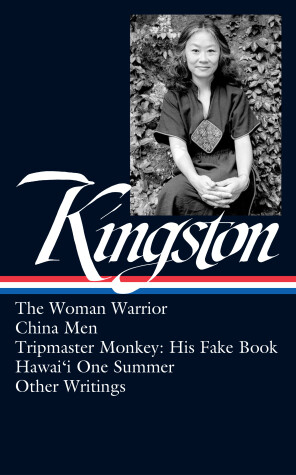LOA
1 primary work
Book 355
The largest and most comprehensive edition of our foremost Asian American writer: three classic books and additional writings, many rare, that together offer a vivid and searching portrait of immigrant experience and American dreams.
Maxine Hong Kingston made a stunning entrance on the American literary scene with The Woman Warrior (1976), her “memoirs of a childhood among ghosts." Not only an account of growing up poor and Chinese American in the San Joaquin Valley, it was also an audacious feat of imaginative transformation and pathbreaking work of feminist autobiography, drawing on ancient myths and the family stories her mother brought over from China to make sense of a transformed life in America.
A companion to The Woman Warrior, which she called her “mother-book,” Kingston’s “father-book” China Men (1980) spreads out across a large geographical and historical canvas to envision the lives of her male relatives who immigrated to America. Taken together, The Woman Warrior and China Men offer a profound, kaleidoscopic, genre-defying narrative of the American experience.
Kingston's third book, Tripmaster Monkey: His Fake Book (1989), is the wildly inventive story of Wittman Ah Sing, a Berkeley graduate student whose experience of the San Francisco Beat scene transforms his understanding of his own Chinese heritage.
Rounding out the volume are a series of essays from 1978 reflecting on her life in Hawaii, later collected as Hawai‘i One Summer, personal musings whose subjects range from the contentions of a conference of Asian American writers to home-buying, surfing, and the work of the Beat poet Lew Welch.
Also included are hard-to-find essays about the creative process and Kingston’s exasperated, insightful account of how most of the reviewers of The Woman Warrior fell prey to lazy stereotypes about the “exotic” and “inscrutable” East.
Maxine Hong Kingston made a stunning entrance on the American literary scene with The Woman Warrior (1976), her “memoirs of a childhood among ghosts." Not only an account of growing up poor and Chinese American in the San Joaquin Valley, it was also an audacious feat of imaginative transformation and pathbreaking work of feminist autobiography, drawing on ancient myths and the family stories her mother brought over from China to make sense of a transformed life in America.
A companion to The Woman Warrior, which she called her “mother-book,” Kingston’s “father-book” China Men (1980) spreads out across a large geographical and historical canvas to envision the lives of her male relatives who immigrated to America. Taken together, The Woman Warrior and China Men offer a profound, kaleidoscopic, genre-defying narrative of the American experience.
Kingston's third book, Tripmaster Monkey: His Fake Book (1989), is the wildly inventive story of Wittman Ah Sing, a Berkeley graduate student whose experience of the San Francisco Beat scene transforms his understanding of his own Chinese heritage.
Rounding out the volume are a series of essays from 1978 reflecting on her life in Hawaii, later collected as Hawai‘i One Summer, personal musings whose subjects range from the contentions of a conference of Asian American writers to home-buying, surfing, and the work of the Beat poet Lew Welch.
Also included are hard-to-find essays about the creative process and Kingston’s exasperated, insightful account of how most of the reviewers of The Woman Warrior fell prey to lazy stereotypes about the “exotic” and “inscrutable” East.
